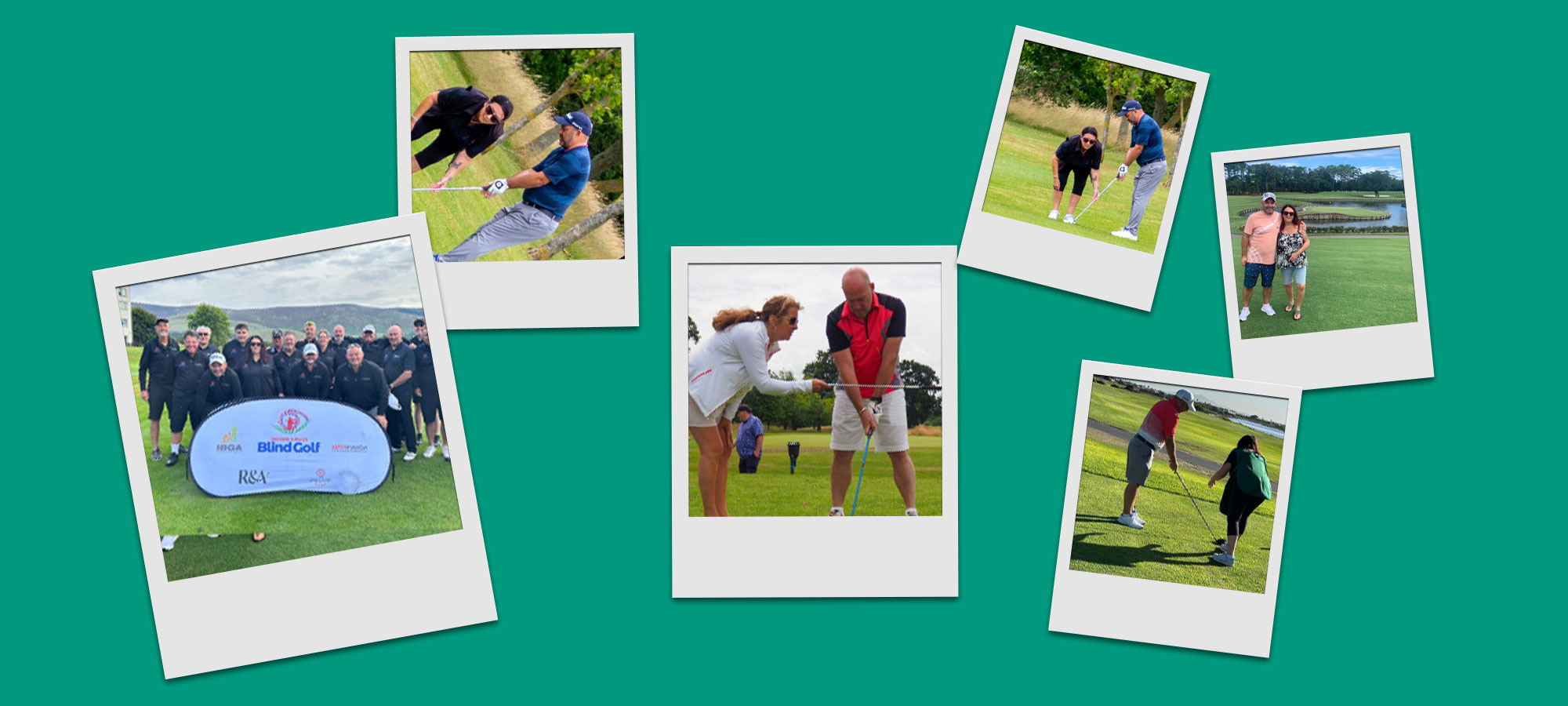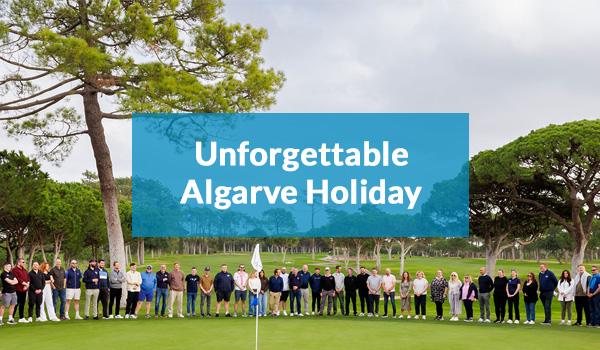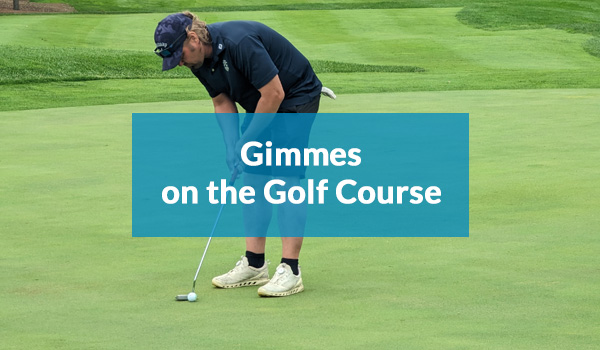“Golf has given back what our sight has stolen from us”
We interview Andy Gilford, Trustee at English & Wales Blind Golf, for our All Fore One! campaign
In our latest interview, we had the pleasure of speaking with Andy Gilford, a prominent figure in the world of blind golf.
Andy’s journey in golf began in his youth, initially helping out his friends as a caddie. Despite being registered blind from birth, Andy’s involvement in golf grew, leading him to discover and embrace the world of blind golf.
This discovery was not just a new sporting challenge for him but also a way to connect with others and to challenge perceptions about sight loss and sports.
As a trustee of the England and Wales Blind Golf (EWBG) charity, Andy has been actively involved in promoting blind golf and supporting others with sight loss in the sport.
Representing his country in international competitions and contributing significantly to the blind golf community, Andy’s experiences offer valuable insights into how sports can be adapted and enjoyed by everyone, regardless of physical challenges.
In our conversation with Andy, he shares his experiences and perspectives on how golf has been both a personal passion and a tool for positive change in the lives of visually impaired players.
Could you start by telling us about your background and how you got into playing golf?
❝ Yeah, certainly. I’ve been registered blind from birth, with less than five percent vision.
I started playing golf as a junior because my friends joined a local golf club in Lancashire.
I started off by caddying for them, and they encouraged me to get my own set of clubs – they said they would help me find my ball and where to aim. That’s where my golf journey began.
Later, I learned about blind golf from Peter Allis, one of our patrons, who mentioned it during the British Open on BBC. This led me to contact the charity, opening a whole new world to me, something I had never dreamt of as a child. Through blind golf, I’ve been able to play around the world, represent my country, and play in Blind Ryder Cups and World Championships. ❞
What did golf give you that you didn’t have until that point?
❝ Golf gave me confidence. I struggled as a child, coming to terms with my sight loss. Sport was something I enjoyed, but my options were limited because of my vision. Golf helped me overcome my embarrassment about asking for help. It also gave me a sense of pride in what I could achieve through the sport. I’ve made friendships through golf not just in England and Wales but all around the world. It’s something I recommend to anyone, especially those starting to lose their sight.
As people start to lose their sight, one of the first things to get packed away is golf clubs. But that shouldn’t be the case. Lots of my friends played golf when they were fully sighted and then gave up completely, only to come back to it in later life once they knew about blind golf. They all say the same thing: “I wish I knew this existed earlier.”
Your friends play a huge part in being able to help you through the tough times that come from losing your sight, which can lead to potentially losing your job, not being able to drive, and almost losing your independence. And golf is a great way of friends or family being able to help you still feel a part of the group.❞
Do you have any other examples of success stories from the charity?
❝ One of our members, called Billy, lost his sight literally overnight. He went to bed one night and woke up the next morning with two detached retinas. And he couldn’t cope with it – he ended up losing his family and friends because he was so angry and was homeless, living in a hostel.
He would say “I know I’ll be alone for the rest of my life. I’ll never work again.” That was ten years ago – now he’s the most positive guy you could ever meet, in a senior job at the Department for Work and Pensions and is getting married next year, all because of golf.
A number of years back another member drove his daughter to the optician earlier this to get his daughter’s eyes tested and thought he’d get his tested while he was there.
The optician asked him how he had got there and he told them he’d driven. The optician said: “We’re sorry, we’re going to have to register you blind here and now.” He had aggressive glaucoma. He just thought he was tired from working long shifts and his eyes were blurry.
His whole world fell apart that day in an instant. But he says today that golf has given him back what his sight stole from him. The very next year he won the World Championships in Rome after shooting a nett 59.
The opportunities the game gives you are incredible.
There’s never a mental health counsellor sat next to you when you get told you’re losing your sight, so your mind’s spinning. So if you said to someone then – in a few years’ time you’ll be representing your country, travelling the world playing golf, they’d never believe you. But it happens.
For instance, the international team is picked from our Order of Merit. Last year there were seven new players in that team that had all come forward through the charity. They’d have never believed you if you’d told them they’d be playing for their country at the end of the year. ❞
How can someone who’s not familiar with blind golf get involved?
❝ You can look at our website or our social media platforms @EWblindgolf to start with.
Blind golf is played internationally. There are organisations in most countries, including Scotland, Northern Ireland, and Ireland.
There are three categories in blind golf: B1 for those who are totally blind, B2 for people like me with less than five percent vision, and B3 for those with less than ten percent vision.
You’d be amazed at the standard of play with just a little bit of adaptation. The best player in the world at the moment in the B1 category plays off 16. I’m in B2 and I’m off 13, with the lowest in the category being off 11, and in B3 the current world number one plays off 1.
With help and support anything is possible. ❞
What do the first steps look like for someone getting involved via the charity?
❝ The first thing to do is contact the charity and make it known that you want to carry on playing, or start playing. Every penny we raise as a charity goes back out to cover the cost of our players.
We have events across the country and help with travel expenses, accommodation and food. And a big part of what we do is making sure our volunteers are compensated for giving the players their time and eyesight!
We’re constantly looking for support from golf clubs and individuals. Every day 250 people start to lose their sight in the UK, and when you look at those numbers you know there will be somebody out there at a golf club that reads this that is already going through it and has considered packing the sport in. ❞
How does a guide assist in blind golf?
❝ We can’t play golf without a guide.
A guide is someone who is fully sighted who helps with club placement, lining up shots, providing yardage information, describing the course layout, describing ball flights, saying where the ball ended up and so on. It’s actually a team game – our success depends on our guides’ success.
Two of our members recently have had holes in one – imagine the guide’s feeling playing a part in that ball dropping into the hole! It’s pure joy for both.
It’s a great thing for couples to do too. If one of them starts to lose their sight, they can keep playing.
And you don’t even have to be a golfer. My wife’s not a golfer. A lot of our members’ partners aren’t. It’s really just a case of being able to line you up with a decent set of eyes!
And it’s really important to talk about because people think about blind golf and think it only benefits those with sight loss, but it can actually help anyone in the community.
For example, someone contacted us to tell us that their mum had recently died, and they wanted to get their dad, who is fully sighted, involved in blind golf because he is a really keen golfer and needed an activity to do that would give him something back in his life and help him build friendships. ❞
Have you seen a change in golf as a sport over the years?
❝ Yes, technology has made a huge difference, especially for people with limited sight. GPS and tools like Toptracer have almost given us our sight back. We can actually get feedback on our shots so we can practise like fully sighted golfers.
And golf has definitely become more accessible and inclusive over the years, with disabled sports gaining more recognition. The club I play at is very supportive; if my wife can’t guide me, other members step in.
It’s much more accessible to young people now too. We’ve got a young lad that first came into the charity when he was about 15. His dad came to us and said: “My son’s totally blind and I’m looking for something to do with him where we can spend quality time together.”
Golf is probably one of the last things that a lot of parents will look at if they have children with sight loss, but it shouldn’t be – think of the quality time that you will get to share together on that golf course.
I played with a young lad from Australia in the British Open this year and they travelled over from Australia with his family. He didn’t have the best of rounds and we were stood at the bar afterwards. His dad, who was his guide, was in pieces saying to me “I think I’ve let him down”. I said: “Look at the bigger picture, you’ve just spent five to six hours today having quality time doing something that your son loves doing – how amazing is that?”❞
Can you share some of your most memorable experiences in golf travel?
❝ Every two years we have the World Championships – that was at Milnerton Golf Club in Cape Town earlier this year which was fantastic. And I was lucky enough to win my category there!
I’ve been able to play in Japan, Australia, America, Canada and more.
I was also lucky last year to play in the Blind Ryder Cup. I’ve played in the last four, but last year’s was at TPC Sawgrass. For all the guides and everyone to be involved in that was fantastic. The guides were even getting to hit onto the 17th green during our practice round, which is a bucket list experience for most people!
It was surreal to play a course you’ve grown up playing on computer games and watching on TV. You get off the bus there and it’s what I can only imagine golf heaven is like. Everything is immaculate, we’ve got our names on the lockers in the locker room, it was incredible.
And everybody hit the green on 17th too! In fact, the closest to the pin in the practice round was 6 feet, and that was a guy who was totally blind. ❞
Finally, what can fully sighted golfers do to support blind golf?
❝ Sighted golfers can volunteer as guides or support the charity in various ways. We’re always looking for new partners to come on board and to sponsor events and spread awareness of that charity and blind golf.
But really it’s just about giving your time. Giving your eyesight to somebody for a couple of hours.
When you think about the number of people losing their sight right now in the UK – that could easily be one of your fourball. What would you do if that was the case? Would you just let them sit at home? Or would you play a part in keeping them playing? ❞







One Comment